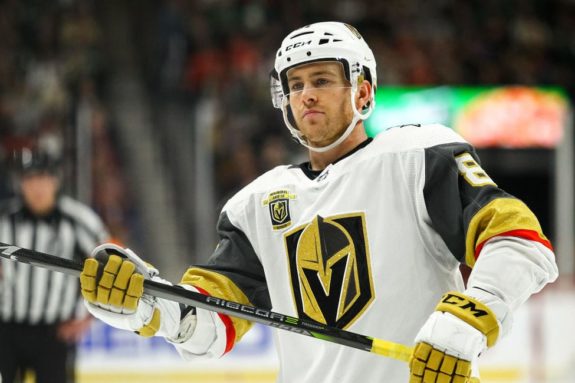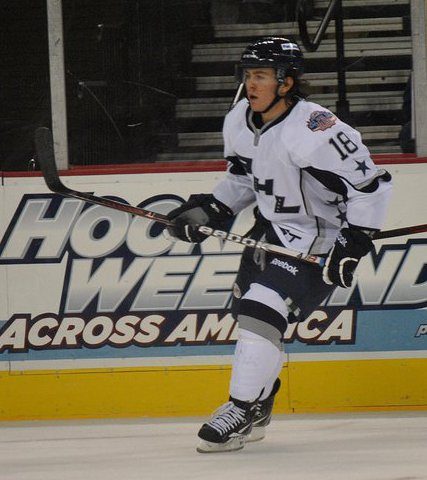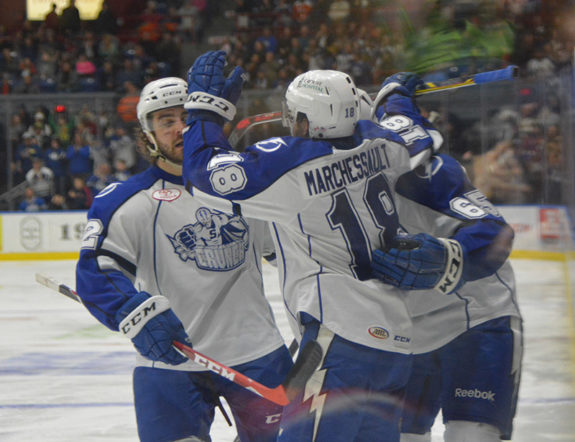Normally, concerning yourself with hypotheticals and the “what could have been” is a one-way trip to regret and discontent with past decisions. After all, hindsight is 20/20. This is especially applicable to sports when an entire franchise’s success can hinge on a trade or draft pick. For every excellent trade or late-round success story, there’s an equally impactful player that slipped through the grasp of the team.
Jonathan Marchessault has become a regular top-six threat in the NHL, most notably with the Florida Panthers and Vegas Golden Knights. He leads all Golden Knights with 181 points in their three-year existence and played an integral role during the Knights’ insurmountable Stanley Cup run in 2017-18.

Before all his success at the NHL level, Marchessault had to endure through four years with three different AHL squads, one of which was the Connecticut Whale. The New York Rangers were the first to give the undersized, undrafted center a chance for the 2011-12 season, but inevitably let him slip through their fingers after just one season in the organization.
Brief Stint with the Whale
Even Marchessault’s beginnings were defined by doubt and reluctance. Before his success at the NHL or even the AHL level, the Quebec native was faced with hesitation from QMJHL scouts. He wasn’t selected to the Quebec Remparts until the 12th Round of the 2007 QMJHL Draft. He inevitably became a First Team All-Star and led the Remparts to a Semifinal finish in the 2011 playoffs, scoring 33 points in just 18 games. His 95-point season in 2010-11 was good for sixth in the league. His point production alone would normally have warranted a late-round selection in the NHL Entry Draft.
Related: Henrik Lundqvist – By the Numbers for No. 30
However, Marchessault never received such a selection as no team was willing to take a chance on the 5-foot-9, Quebec-native. His NHL career would have to be shaped from the undrafted free agent market.
The Rangers were the first to keep tabs on Marchessault. Dean Stork, the then-coach of the Rangers’ ECHL affiliate Greenville Swamp Rabbits suggested that they give him a shot. Upon signing the contract, the then-21-year-old was told he’d likely be spending his year in the ECHL. However, after a strong performance in the Traverse City Tournament and Prospect Camp, he warranted a spot with the Whale.
“I told myself I don’t want to waste a year in the East Coast [Hockey League],” Marchessault said. “So this summer, I starting thinking a lot that I wanted to be an AHL player. As a hockey player, you always have to want more. I wanted to have ice time, I wanted to have all those opportunities to do better.”
(from ‘Audy-Marchessault Impressive With Whale,’ Hartford Courant, 12/08/2011)
Despite his lack in size, Marchessault immediately became an impact player on a Whale team that featured well-known Rangers such as Mats Zuccarello and Carl Hagelin. He finished his first professional season with 24 goals and 40 assists in 74 games, adding four more goals in nine playoff games. Those regular season totals led the team in assists and tied for the lead in points. He was the third-highest scoring rookie in the AHL, trailing only Cory Conacher and Tyler Johnson, and was one of the Whale’s two All-Star representatives along with Zuccarello.

Marchessault was shattering expectations as an undrafted signing who was slated to start the season in the ECHL. He was already beginning to emerge as a dark horse candidate for the Rangers’ roster in the 2012-13 season. Unfortunately, then general manager Glen Sather and assistant general manager Jeff Gorton didn’t see Marchessault’s potential value.
Where it Went Wrong
Following his promising rookie season in the AHL, Sather and Gorton mulled over offering their diamond in the rough a new contract. Eventually, July 1 hit and Marchessault could officially field offers from other teams. The Rangers, while not immediately, did end up offering him a routine entry-level contract that was rejected for a similar offer by the Columbus Blue Jackets. In this case, the money wasn’t what kept Marchessault deterred from remaining a Ranger. He felt his chances of reaching the NHL level were greater with a different franchise.
I didn’t leave because of the money,” said Audy-Marchessault. “The offers were about the same, but I thought I had a better chance to make the NHL with Columbus. I loved the Rangers organization, very classy, but I had to think of it as a business. I knew I would make my mark again with the Whale, but it’s everyone’s dream to play in the NHL, and I thought I had a better chance with the Blue Jackets.
(from ‘Pre-season Finale: Hats Off to Kreider in Whale Win,’ Howlings, 10/07/12)
What’s particularly harrowing about this quote is that the John Tortorella-led Rangers of 2012-13 had pitiful forward depth, due in part of the Rick Nash trade in the 2012 offseason. For most of the season, players such as Darroll Powe, Stu Bickel, Micheal Haley, Brandon Mashinter, Kris Newbury, Benn Ferrerrio, Jeff Halpern and Aaron Asham were all featured for extended lengths, including time in the postseason.
Their forward depth was so poor that it led Sather to trade for Ryan Clowe and dealing Marian Gaborik for Derrick Brassard, Derek Dorsett and John Moore at the trade deadline. To think that a proven 22-year-old AHL All-Star couldn’t break into that roster is a stretch, to say the least.
Related: Top 10 Hockey Celebrations of All-Time
The Rangers were inevitably eliminated by the Boston Bruins in the Eastern Conference Semifinals and Tortorella was relieved of his coaching duties in the offseason. Meanwhile, Marchessault enjoyed two more successful seasons with the Blue Jackets AHL-affiliate before being dealt along with Dalton Smith to the Tampa Bay Lightning for Dana Tyrell and Matt Taormina, both of whom are no longer in the NHL system.

After three seasons between the Lightning and their AHL-affiliate, Marchessault left to sign a one-year contract with the Panthers where he earned a regular NHL role and exploded for 30 goals and 21 assists in the 2016-17 season. The expansion draft brought him to Las Vegas where he’s shaped out a key role on a Stanley Cup contender, signed until 2024 at a team-friendly $5 million AAV.
You could drive yourself mad thinking of all the potential scenarios and hypotheticals, especially given the Rangers failed Stanley Cup runs of the early 2010s. However, it’s impossible to not imagine what could have been if the Rangers had pursued him harder and got him to remain in the organization.